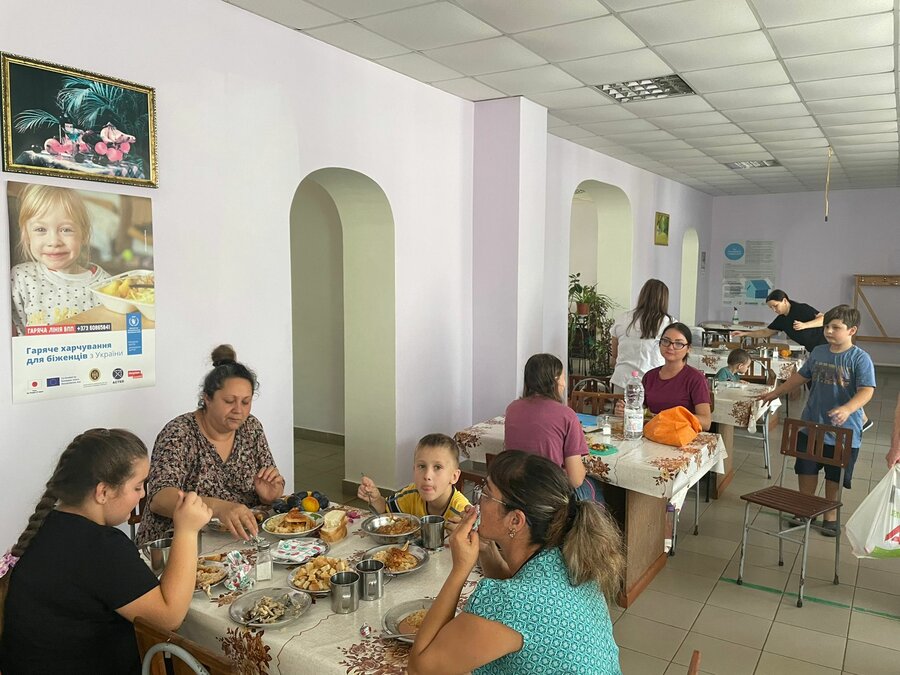In Moldova, Ukrainian refugees get a taste of home
Tatiana wakes up each day before sunrise to make her 30 km commute to the Școala Profesională vocational school, in the central Moldovan city of Criuleni.
She takes pride in her four decades as the school’s head chef, but this year her job has taken on an extra-special meaning — ever since the school began hosting refugees from the war in Ukraine.
“I always think about dishes that can remind them of home. I want them to be happy here,” said Tatiana, with a warm smile.
As a child, she fled a 1992 conflict in Moldova, so she knows how it feels to have one’s whole world upended by fighting. She’s made it her personal mission to offer compassion and humility to those now under her care.
Today, some 75 refugees from Ukraine, including 40 children, live in dormitories at the school, one of 69 Refugee Accommodation Centres around the country. The World Food Programme (WFP) is supporting 42 of them.
Those without on-site cooking capabilities receive catered hot meals three times daily. But others like the Criuleni centre, with government-approved kitchen facilities, receive commodity vouchers to purchase food from local shops, with cooking on-site.
So far, between the hot meals and the commodity vouchers, WFP has distributed over one million meals to refugees housed in accommodation centres across Moldova.

The support for the refugees is part of WFP’s broader response to the refugee influx in Moldova. We are also delivering cash-based transfers to more than 12,000 Moldovan families hosting them—with more than US $4 million injected into the local economy since March.
For the Criuleni centre, WFP assistance means no longer having to depend on local good will.
“We had to fundraise from the community, it was very difficult and a little humiliating for us,” says the centre’s manager Vasile. “Now, thanks to these vouchers, we’re completely self-sufficient.”
Harsh winter ahead
Here, it’s the refugees here who decide what will end up on their plates. At the end of each day, cook Tatiana and her team ask them what they would like to eat the next day, so the meals are always varied.
“We especially don’t want the kids to get bored of the food. It’s important they get a nutritious diet,” says Viorica, the assistant kitchen manager, describing the menus with enthusiasm. “We buy milk, vegetables, corn products, meat — even baby formula for new-borns.”
A nurse by trade, Viorica joined the centre’s staff to help coordinate the menu, and cater to the diverse dietary needs of the refugees, whose ages range from one to 82.
She has seen the number of residents peak at 150 during the first months of the conflict. Their numbers have since dwindled as some refugees moved elsewhere in Europe, while others returned to their homes in Ukraine or went to stay with relatives.
In Moldova, the recent lull in border crossings feels like a calm before the storm. An acutely harsh winter is looming, made more difficult by this year’s hike in food and fuel prices. Fighting may also intensify in Ukraine, sparking a fresh influx of refugees.
"We hope the war ends as soon as possible,” says Vasile, the centre’s manager — even as he anticipates more Ukrainians arriving in the coming months.
“We’re ready to help as many people as we can here,” he adds.
There is plenty of room to board them; the complex can house up to 250 people, while still managing its normal functions as a vocational school.
Every month, the school receives a stack of WFP vouchers, which translate into 100 Lei (about US$5) per person, per day.
“With this amount," Vasile says, “the refugees here are able to eat well.”
WFP’s hot meals in Moldova are made possible thanks to generous contributions from the Government of Japan and the European Commission’s Humanitarian Aid and Civil Protection department (ECHO).


